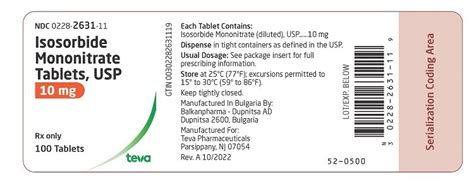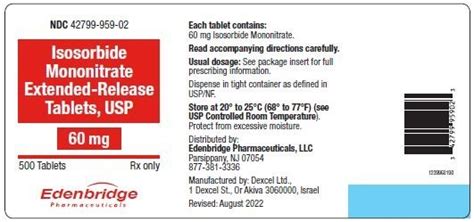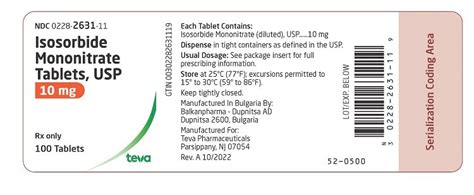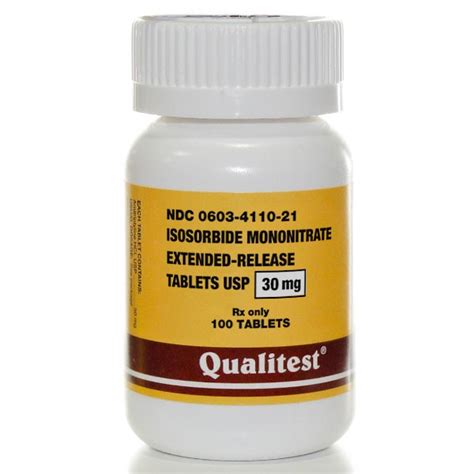Intro
Discover key facts about Isosorbide Mononitrate, including its uses, benefits, and side effects, as a nitrate medication for angina treatment, heart health, and cardiovascular disease management.
Isosorbide mononitrate is a medication that plays a crucial role in managing angina pectoris, a condition characterized by chest pain or discomfort due to coronary heart disease. Understanding the facts about isosorbide mononitrate can help individuals better manage their condition and improve their quality of life. In this article, we will delve into the world of isosorbide mononitrate, exploring its benefits, working mechanisms, and key information related to its use.
Isosorbide mononitrate is a nitrate medication that works by relaxing and widening blood vessels, which improves blood flow to the heart. This action helps to reduce the amount of blood returning to the heart, which in turn decreases the heart's workload and its demand for oxygen. As a result, isosorbide mononitrate helps to prevent or alleviate angina attacks. The medication is available in various forms, including tablets and extended-release tablets, allowing for flexible dosing options.
The importance of managing angina pectoris cannot be overstated. Angina is a symptom of an underlying heart condition, and if left unmanaged, it can lead to more severe complications, such as heart attacks. Isosorbide mononitrate, as part of a comprehensive treatment plan, helps individuals with angina to lead more active lives, reducing the frequency and severity of angina attacks. Moreover, understanding the proper use of isosorbide mononitrate, including its dosing, potential side effects, and interactions with other medications, is essential for maximizing its benefits while minimizing risks.
Benefits of Isosorbide Mononitrate

The benefits of isosorbide mononitrate are multifaceted, primarily revolving around its ability to effectively manage angina symptoms. By reducing the frequency and severity of angina attacks, isosorbide mononitrate improves the overall quality of life for individuals with coronary heart disease. This medication allows patients to engage in physical activities with more confidence, knowing that they have a reliable means to prevent or alleviate angina pain. Furthermore, the extended-release formulations of isosorbide mononitrate provide sustained relief, making it easier for patients to adhere to their treatment regimen.
Key Mechanisms of Action
Isosorbide mononitrate works through a specific mechanism that involves the release of nitric oxide, a potent vasodilator. Nitric oxide causes the smooth muscle of the blood vessels to relax, leading to vasodilation. This effect reduces vascular resistance and decreases the preload on the heart, which is the initial stretching of the cardiac myocytes prior to contraction. The reduction in preload decreases the heart's oxygen demand, which is particularly beneficial during episodes of angina, where the heart's oxygen supply is already compromised.Steps for Effective Use

To use isosorbide mononitrate effectively, patients should follow these steps:
- Take the medication as directed by the healthcare provider, noting the specific dosage and timing.
- Understand the differences between immediate-release and extended-release formulations and use them accordingly.
- Be aware of potential side effects, such as headaches, and report any severe or persistent effects to the healthcare provider.
- Maintain a consistent schedule to ensure continuous therapeutic levels of the medication.
- Monitor angina symptoms and adjust the treatment plan as necessary in collaboration with the healthcare provider.
Practical Examples and Statistical Data
Studies have shown that isosorbide mononitrate significantly reduces the frequency of angina attacks and improves exercise tolerance in patients with stable angina. For instance, a clinical trial might demonstrate that patients taking isosorbide mononitrate experience a reduction in angina episodes from an average of 5 per week to 2 per week, alongside an increase in exercise duration without pain. Such data underscores the efficacy of isosorbide mononitrate in managing angina and improving patients' quality of life.Potential Side Effects and Interactions

While isosorbide mononitrate is generally well-tolerated, it can cause side effects, including:
- Headaches due to its vasodilatory effects
- Dizziness or lightheadedness, especially when standing up from a sitting or lying position
- Flushing or rash
- Nausea or vomiting
It's also crucial to be aware of potential interactions with other medications, such as:
- Phosphodiesterase inhibitors (e.g., sildenafil), which can potentiate the hypotensive effects of isosorbide mononitrate
- Certain antihypertensive drugs, which may enhance the blood pressure-lowering effects of isosorbide mononitrate
Management of Side Effects
Managing side effects often involves adjusting the dosage of isosorbide mononitrate or the timing of its administration. For example, taking the medication with food may help alleviate nausea. In cases where side effects are severe or persistent, the healthcare provider may consider alternative treatments or adjust the patient's regimen to minimize adverse effects while maintaining therapeutic efficacy.Future Perspectives and Research

Ongoing research into isosorbide mononitrate and other nitrate medications continues to uncover new insights into their mechanisms of action and potential applications. Future studies may explore the use of isosorbide mononitrate in combination with other drugs to enhance its efficacy or reduce side effects. Additionally, the development of new formulations, such as sustained-release forms, could further improve patient compliance and outcomes.
Conclusion and Recommendations
In conclusion, isosorbide mononitrate is a valuable medication for the management of angina pectoris, offering significant benefits in terms of reducing the frequency and severity of angina attacks. By understanding its working mechanisms, potential side effects, and interactions with other medications, patients can maximize the benefits of isosorbide mononitrate while minimizing risks. It is essential for patients to work closely with their healthcare providers to tailor their treatment plans to their individual needs and to stay informed about the latest developments in angina management.Final Thoughts and Encouragement

As we conclude our exploration of isosorbide mononitrate, it's essential to encourage individuals with angina to take an active role in their health management. This includes adhering to prescribed medication regimens, adopting lifestyle modifications such as regular exercise and a balanced diet, and maintaining open communication with healthcare providers. By doing so, individuals can effectively manage their angina, reduce the risk of complications, and improve their overall well-being.
We invite readers to share their experiences or questions regarding isosorbide mononitrate and angina management in the comments below. Your insights and inquiries can help foster a supportive community and contribute to a deeper understanding of this important topic. Additionally, consider sharing this article with others who may benefit from the information, helping to spread awareness and promote better heart health.
What is the primary use of isosorbide mononitrate?
+Isosorbide mononitrate is primarily used to prevent or alleviate angina attacks in individuals with coronary heart disease.
How does isosorbide mononitrate work?
+Isosorbide mononitrate works by releasing nitric oxide, which causes blood vessels to relax and widen, improving blood flow to the heart and reducing its workload.
What are common side effects of isosorbide mononitrate?
+Common side effects include headaches, dizziness, flushing, and nausea. These side effects are usually mild and temporary.
Can isosorbide mononitrate be used with other medications?
+Yes, but it's crucial to inform your healthcare provider about all medications you're taking to avoid potential interactions. Certain medications, like phosphodiesterase inhibitors, should be used with caution.
How can I maximize the benefits of isosorbide mononitrate?
+To maximize benefits, take the medication as directed, maintain a healthy lifestyle, and regularly monitor your condition with your healthcare provider.
